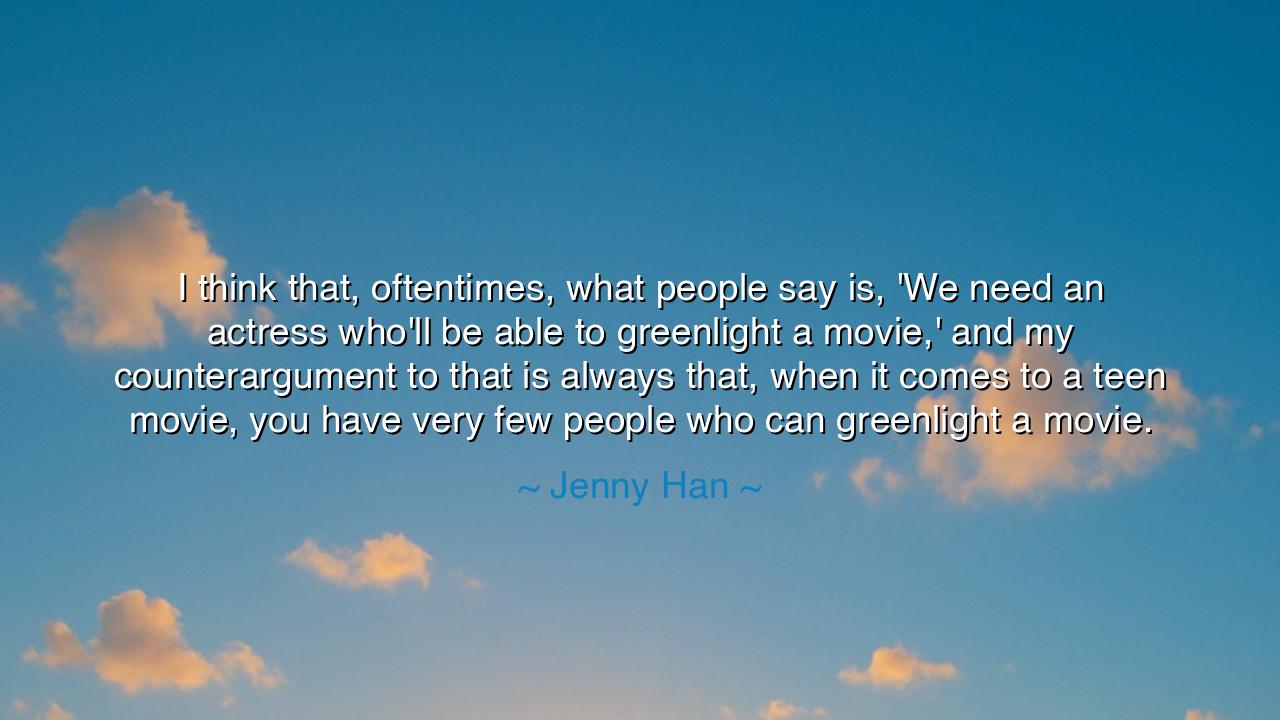
I think that, oftentimes, what people say is, 'We need an
I think that, oftentimes, what people say is, 'We need an actress who'll be able to greenlight a movie,' and my counterargument to that is always that, when it comes to a teen movie, you have very few people who can greenlight a movie.






When Jenny Han declared, “I think that, oftentimes, what people say is, ‘We need an actress who’ll be able to greenlight a movie, and my counterargument to that is always that, when it comes to a teen movie, you have very few people who can greenlight a movie,’” she was not merely speaking of the film industry, but of the imbalance between art and commerce, between the purity of story and the machinery of profit. Her words rise as both critique and reminder: that the worth of a tale should not be measured solely by the power of names, but by the truth it speaks and the hearts it reaches.
The origin of her reflection lies in the world of Hollywood, where projects often live or die based on whether a single star has the ability to “greenlight”—to guarantee financing, distribution, and visibility. Yet Han points out the irony: in the realm of teen movies, those stories meant to capture the fragility, beauty, and intensity of adolescence, it is rare indeed that any actor, no matter how talented, has such power. The young are rarely granted the authority to command budgets; they are still at the beginning of their craft. And so the argument for star power collapses, leaving behind the deeper truth: that what draws audiences to teen movies is not fame, but authenticity.
History echoes this lesson. When Rebel Without a Cause was first conceived, James Dean was not yet the cultural giant he would become. It was not his name that greenlit the film, but the raw honesty of his performance that immortalized it. In the same way, films like The Breakfast Club or Clueless became iconic not because they were anchored by towering stars, but because they captured the universal voice of youth. Han’s wisdom is this: that teen movies thrive not on power but on relatability, not on fame but on truth.
Her words also carry a challenge to the industry itself. To insist on a “greenlighting actress” before a story can be told is to place barriers before fresh voices, new faces, and diverse stories. It is to say that the worth of the narrative is secondary to the worth of celebrity. But Han resists this, reminding us that stories about the young—and especially about marginalized youth—must not be suffocated by such demands. For if every teen movie requires a name that already carries weight, then the door is closed to those whose stories most need to be told.
This is a lesson that extends beyond cinema. Throughout history, innovation often began with those who had no “greenlighting power.” Galileo had no seat of authority when he turned his telescope to the stars. The Brontë sisters, writing under false names, had no social standing to guarantee success. Yet their works endure, not because of power, but because of authenticity and vision. Han’s declaration belongs to this lineage: it is a plea to measure worth not by influence, but by the integrity of the work itself.
The teaching here is profound: do not wait for permission to tell your story. Whether or not you possess the power to greenlight your own project, create it. The greatness of a story lies not in its budget, but in its truth. And often, it is the stories least supported by power that resonate the longest, because they spring from honesty and necessity rather than calculation.
Practical wisdom flows from this. If you are a creator, do not despair when you are told you lack the power or name to command attention. Pour your energy into the craft, into the authenticity of your vision. If you are a supporter of art, champion projects that elevate new voices rather than merely recycle the familiar. And if you are a consumer, remember that your choice to engage with smaller, less publicized stories can shape the culture as much as any celebrity’s name.
Thus Jenny Han’s words become more than an industry critique. They are a call to arms for artists and audiences alike: that the measure of a story should not be the fame of the actress, but the depth of its truth. Teen movies, like all stories of youth, endure because they speak to the universal heart. And so we pass this teaching to future generations: do not let the power of a few decide which stories are worthy. For in every untold tale there may lie the seed of greatness, waiting only for the chance to bloom.






AAdministratorAdministrator
Welcome, honored guests. Please leave a comment, we will respond soon